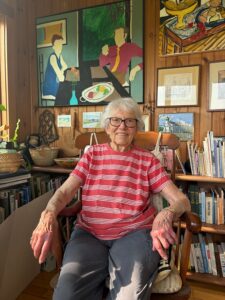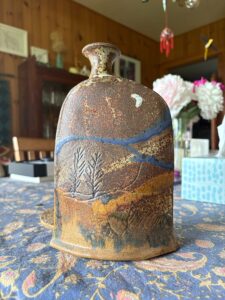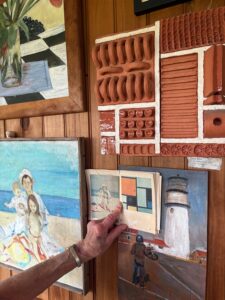TRURO — Anne Irwin wishes that people were more curious about her living room. After 100 years on Earth, 89 summers on the Cape, and 35 years of living in Truro, she has assembled a revealing collection of books and original artwork in her North Pamet Road home.

A wooden frog dangles its spindly legs over photographs of her grandchildren. A plush raven reclines in a wheelbarrow. Her own handmade vases share her bookshelf with the complete works of New Yorker writers E.B. White and James Thurber.
“I haven’t read all of them yet,” she says. “There is so much to learn, all the time.”
Irwin, who turned 100 on May 19, grew up in New Rochelle, N.Y next door to her family’s greenhouses. Her father, Werner Leib, was a horticulturist and often enlisted Anne and her older sister, Margaret, to plant seedlings, wrap flowers in newspaper, and join him on deliveries across town.
“My father didn’t appreciate it when we tried tightrope-walking on the edge of the pansy flats,” Irwin says.
In 1937, she spent her first summer in Truro. By 1942, her parents had bought 14 acres for $800. They placed a small house from Wellfleet on the back of a truck and moved it to their new property, calling it “the shack” because it lacked electricity and running water. It served as their summer residence until her parents moved to town in 1957.
“You could pump a pail of water and take it to the bathroom, and then you could flush the toilet,” Irwin says. “It was a modest place to live.”
The dormitories at Oberlin College had more amenities when Irwin enrolled there in 1942. Unsure of what to study, she chose history because the department allowed her to take a wide range of courses, from birdwatching and ecology to European art history. She recalls one lecture that helped civilians identify planes flying overhead during World War II.
“I don’t have any memories of deprivation during wartime,” she says. “We kept track of what was going on, but we handed in our ration cards and were very well fed.”
After college, Irwin moved to Washington, D.C. to assist Irene Barnes Taeuber with her study on the population of Japan. It was there that she met her first husband, Bruce Wolff, who had just returned from his wartime service in Europe. She attended the Columbia School of Social Work and practiced for two years before moving to Yonkers and having three children: Nina, Eric, and Amy.
“I was a typical 1950s woman who stayed home with her kids, which I really appreciated,” Irwin says. “I did not feel, ‘Oh dear, I wish I was working.’ It was a privilege.”
Before Irwin and Wolff divorced in 1979, she had become a regular at the Riverdale-Yonkers Society for Ethical Culture. Its Sunday meetings were inspired by a simple question: how can we live the good life without God and Jesus? The answers were profoundly important to Irwin, who then worked as a pottery teacher and “recreational therapist” at the Hebrew Home for the Aged in Riverdale.
“They loved to tell stories, and I loved to listen,” she says. “And so, it was a very compatible job.”

At Ethical Culture meetings, she found common ground with a quiet man named Howard Irwin. He had recently led expeditions to Brazil and Suriname as president of the New York Botanical Garden. Before long, they were married beneath the soaring glass dome of the garden’s conservatory.
The newlyweds moved to Huntington, N.Y. in 1979 so that Howard could serve as vice chancellor at Long Island University and director of the Clark Botanic Gardens in Roslyn Heights. When he retired in 1991, they moved to Truro, settling in the same house that Irwin’s parents had lived in.
“We didn’t make any prize gardens,” Irwin says, grinning, in an August 2009 interview posted online as part of the Mass. Memories Road Show, an oral history project started at UMass Boston. “We just tried to have some flowers and some vegetables.”
Blooming geraniums line the walls of her ground floor office in Truro, as do terracotta panels, woven fans, and paintings by local artists including Diane Messinger and Marianne Kinzer. One wall alone features a pastel rendering of Anne and her grandchildren, a portrait of the Highland Light, and a sculpture, Homage to Mondrian, that Irwin modeled from red clay. She has a room-length view of the Pamet River.

“I eat my breakfast here every morning and look out the window and say, ‘I can’t believe I live in this beautiful place.’ ”
Since her husband died in 2019, Irwin has continued to lead a remarkably energetic life on the Outer Cape. Exercise classes, acupuncture, and play-reading groups at the Wellfleet Public Library are part of her regular schedule, and she volunteers every Friday morning at Wellfleet’s AIM Thrift Shop. Sometimes, her youngest daughter drives her; other times, she drives herself.
“I’m sort of the book maven there, and I’m in charge of getting books on the shelves and pricing them,” Irwin says. “Once a year, we close the shop in February, and I go through all the books and date them so that we know how long they’ve been up there.”
Irwin finds it easy to stay busy these days. “There’s so much going on, you can’t possibly keep up with it,” she says. She plans to go to a chamber music concert on Sunday. And there are the Firebirds. “It’s sort of in the back of my head — I should go to a baseball game someday.”
